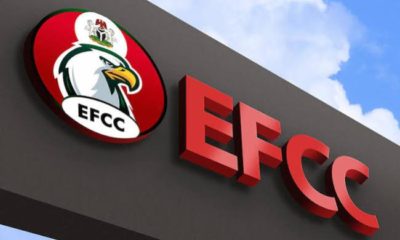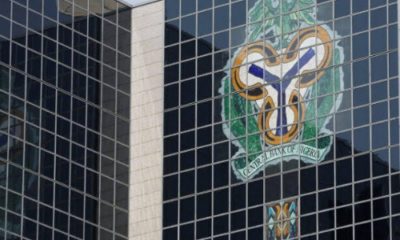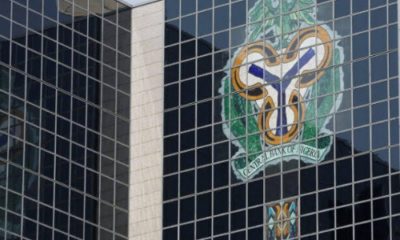Finance
Is the economy poisoned by CBN $ hoarding?

By Henry BOYO
LAGOS-THE crash in crude oil prices from over $145 in 2008 to below $40/barrel presently, has invariably reduced Nigeria’s export earnings by over 50%; consequently, the significant deflation in dollar income is commonly blamed for the persistent intense market pressure on the Naira exchange rate. Interestingly, this perception is, ironically, against, the actual reality that the Naira exchange rate remained static between N152-N160/$1, even when the foreign reserves in CBN’s custody exceeded $60bn.
Incidentally, after 2006, the IMF’s ‘Policy Support’ recommendation to liberalise dollar supply and stabilise Naira exchange rate, soon became an article of faith in CBN’s monetary policy management. Ultimately, almost 3,000 BDCs became licensed to sell weekly dollar allocations supplied from CBN’s reserves. Curiously, dollar allocations to BDCs often exceeded the monthly provision for the real sector, despite their indisputable role as engine of economic growth and prime creators of employment opportunities.
Curiously, however, personal Naira debit cards were actively promoted by the banks, with CBN collaboration to enable Nigerians cash up to $150,000 from ATMs abroad at the official Naira rate, even when it is clear that possibly less than 1% of Nigerians earn N15m annually. Clearly, such uninhibited dollar supply clearly promotes widespread money laundering and liberal imports of contraband which undermine governments’ declared intentions to support local industrialists and create more jobs.
Ironically, while billions of dollars are offered to the BDCs and Nigerian travellers at official rates, some local manufacturers are denied access to CBN dollars and are therefore invariably constrained to fund their dollar needs at over N240/$1, while other equally genuine industrialists may also have to remain in bank queues for several weeks before they obtain forex cover for their critical raw material imports.
Besides, it is certainly irrational for CBN to gleefully sell ‘our’ dollar reserves at face value to BDCs and tourists , while government is simultaneously busy borrowing same dollars externally with an unnecessarily high cost. Nevertheless, the CBN remains resolute that its forex control measures are absolutely necessary to protect the Naira exchange rate and by extension our economy and the welfare of our people .
Evidently, however, the present wide difference between an official (read as subsidized) rate of N197 and the open market price of N240=$1 would expectedly create potentially serious market distortions and threaten economic and general price stability. The above realities notwithstanding, CBN management proudly positions itself as credibly performing its role as the constitutional defender of the Naira Exchange rate with dollar reserves in its custody!
Incidentally, however, if the slide in crude revenue persists, Nigerians may begin to question why fuel imports, Corporate dividends and Technical fees, which consume about 80% of our total forex income, are subsidized with cheaper forex allocations when a significant segment of the real sector, is conversely forced to endure higher black market exchange rates to import those critical inputs they require to produce and create jobs locally.
Regrettably, If this imbalance persists, we may ultimately become helpless against the challenge of cheaper imports of finished consumer goods flooding our markets, forcing factory closures and throwing more Nigerians into an already saturated job market. Nonetheless, it is necessary to examine how CBN accumulates its dollars, since the Apex bank clearly does not engage in the production and export of goods or services that could sustainably fund its relatively high reserves base.
Firstly, we may need to ask who actually owns the reserves in CBN’s custody? Indeed, if the Nigerian Federation truly owns the dollar reserves in CBN’s custody, it would be unexpected and inexplicable for government to simultaneously resort to funding its programmes with external borrowing with higher interest rates when infact it has $30bn idle deposits, which earn minimal or nil yield in CBN vaults and accounting records.
Curiously, in 2013, former President Jonathan, paid a business visit to China with a distinguished delegation which included Ngozi Okonjo-Iweala, Finance and Co-ordinating Minister of the Economy, and Lamido Sanusi, former CBN Governor; while President Jonathan went in pursuit of a $3bn loan package for the enhancement of aviation, railway and marine infrastructure from Export-Import Bank of China and China Development Bank, Lamido Sanusi, the CBN Governor conversely reported that his mission was to assess how some of the CBN’s surplus reserves of about $40bn could be held in alternative currencies such as the Chinese Yuan.
Clearly, the import of the preceding scenario is that CBN reserves are not actually consolidated to bring respite from those social and infrastructural deprivations Nigerians suffer. Furthermore, what infact stops the Chinese Bank from selling Chinese Yuan or at best borrowing Sanusi’s dollar reserves for below 3% and turning round to lend the same funds to President Jonathan’s delegation with a higher interest rate.
The begging question however, is , how can CBN confidently lay sole claim to the dollar cache that is, in the light of the preceding, obviously erroneously called our National reserves. Evidently, the level of CBN’s reserves clearly has nothing to do with any direct economic activity of the Bank. Instructively, therefore, the CBN consolidates its reserves by retaining Nigeria’s export dollar revenue from crude oil and substituting Naira allocations at its own unilaterally determined exchange rate before the distribution of bloated Naira sums to the constitutional beneficiaries of the Federation pool.
So, while the three tiers of government are fed with increasingly worthless Naira values, the CBN ‘wisely’ keeps all the dollars we earn; consequently, any fortuitous increase in dollar revenue for whatever reason, will also increase the burden of systemic Naira surplus which ultimately fires inflation and also induces weaker Naira exchange rates, as the resultant excess Naira supply chase the small rations of dollars that the CBN ironically auctions from time to time TO DEFEND THE NAIRA.
In addition, the subsisting Naira surplus unfortunately induces, highly oppressive cost of funds and also discourages investment and job creation as the same CBN which initially instigated the Naira surfeit, impulsively spikes its benchmark interest rate to banks, to discourage consumer borrowing and liberal spending as a strategy against a threatening inflationary spiral.
Technically, reserves are normally defined as any excess to immediate requirement; consequently, the real reserves we own are those deposits which are constitutionally consolidated from any revenue earned in excess of annual budget projections, and warehoused in the Excess Crude Account and Sovereign Wealth Fund. Consequently, we may once more ask, who owns the reserves? Surely, it would be unconscionable if the three tiers of government also subsequently lay claim to all the dollars in CBN’s custody after they have readily accepted and consumed the substituted Naira allocations. Surely, you cannot have your cake and eat it.
SAVE THE NAIRA! SAVE NIGERIANS.
-Vanguard
Banking
CBN Denies Currency Devaluation

The Central Bank of Nigeria (CBN) has refuted claims of devaluing the.
Earlier reports suggested that the CBN had devalued the Naira, lowering its exchange rate from N631 to the dollar, compared to the previous day’s rate of N461.60 at the Importers and Exporters (I&E) window.
However, the Central Bank of Nigeria (CBN) released a statement on Thursday through its Acting Head of Corporate Communications, Dr. Isa Abdulmumin, categorizing the report as false information.
In the statement titled ‘CBN Has Not Devalued The Naira’, he said the attention of the apex bank was drawn to the news report by an Abuja based newspaper edition of June 1, 2023, titled “CB Devalues Naira To 630/51”.
However, the CBN stated categorically that the news report was replete with outright FALSEHOODS and destabilizing innuendos, ‘reflecting potentially willful ignorance of the said medium as to the workings of the Nigerian Foreign Exchange Market.’
“For the avoidance of doubt, the exchange rate at the Investors’ & Exporters (I&E) window traded this morning (June 1, 2023) at N465/USS1 and has been stable around this rate for a while.
“The public is hereby advised to ignore the news report by Daily Trust in its entirety, as it is speculative and calculated at causing panic in the market,” the CBN spokesman added.
He, therefore, advised media practitioners to verify their facts from the Central Bank of Nigeria before publishing in order not to misinform the public.
Banking
BREAKING: CBN Increases Interest Rate By 0.5%

The interest rate in Nigeria has been raised to 18.5 percent, up by 0.5 percent, from 18 percent where it was pegged in March 2023.
The Central Banks of Nigeria’s (CBN) Monetary Policy Committee (MPC) resolved to this effect at its third meeting of 2023 in Abuja, on Wednesday.
Governor, CBN, Godwin Emefiele, made the disclosure in the communiqué of the MPC’s meeting, thereafter.
While engaging the media at the end of the two-day meeting, Emefiele, said the committee voted to keep the asymmetric corridor at +100 and -700 basis points around the MPR.
In the view of the MPC, rising inflation rate is traceable to the high energy cost and challenges around the supply chain, among others, which lie outside the corridors of the CBN.
Emefiele said, “The current trend in price development would continue to be monitored by the bank with greater collaboration with fiscal authority to address the drivers of inflation.”
Biztellers reports that the CBN had effected six consecutive interest rate increases, which has seen the rate move from 11.5 percent in March 2022 to 18.5 percent in May 2023.
Finance
Dangers Lurk As Nigerians Resort To Refurbished Gas Cylinders

In Nigeria, people have been forced to come up with creative solutions to cope with the effects of inflation and the economic crisis.
These improvised strategies have not only helped individuals save money, but also enabled them to stay afloat during difficult times.
In a concerning development, the recent trend of boycotting the high cost of cooking gas cylinders in Nigeria may pose a greater risk to lives than it does in terms of saving money.
Economy&Lifestyle investigations have revealed that the soaring prices of gas cylinders have reached a point where it has become increasingly challenging for average households to afford them, let alone refill them with gas.
The situation is further exacerbated by the fact that the pump price of kerosene, which would typically serve as an alternative, has become prohibitively expensive.
Upon investigation, it was found that the prices of gas cylinders vary depending on their sizes. A 3kg gas cylinder is priced at N14,000, while a 5kg cylinder costs N16,000. The larger cylinders are even more costly, with a 6kg cylinder priced at N17,000 and a 12.5kg cylinder costing N19,000.
Additionally, the expense continues when it comes to filling these cylinders with cooking gas, as it costs N2,600 for a 3kg cylinder, N5,200 for a 6kg cylinder, N8,950 for a 10.5kg cylinder, and N10,650 for a 12.5kg cylinder.
Consequently, an average household that needs to replace a worn-out 5kg cylinder would have to come up with N20,250 to purchase a new cylinder and fill it with gas, which can be a difficult feat to achieve.
As a result, many people have resorted to refurbishing their old cylinders and trying to use them as best as they can. However, this approach poses a significant danger.
Mrs. Rukayat Adesoji, a trader, shared her experience regarding her gas cylinder, which had become rusted and could no longer stand upright since last month. Due to the exorbitant prices of purchasing new cylinders, she resorted to seeking the assistance of a welder.
The welder patched the legs of the cylinder, repainted it, and ever since then, she has been using the refurbished cylinder for her cooking needs.
She said ““My gas cylinder which was 6kg got rusted and no longer stands erect since last month. When I asked for the price, I was told it was N17, 500. I was discussing it with a friend who advised me to take it to a welder to paint it and construct a new stand. I heeded to her advice and at the end spent just N3, 000 to turn my cooking gas to a brand new.”
Apart from refurbishing cylinders, some people don’t even know when their cylinders will expire. Mrs. Mercy Opara, a hair stylist, falls in that category as she explained: “I am taking my gas cylinder to the welder to spray it for me. It just cost N1, 500.
“The cost of buying a new cylinder is high. I have been using my cylinder for over 7 years and I don’t even know the expiry date. I just pray God blesses me so that I can buy a new one. But this one I am managing will look neat after spraying it for another two years.”
Mr. Adekanbi Joseph, a wielder, said he paints cylinder and “To paint and rebuild a cylinder stand, I charge N4, 500. Many people come here to paint as a new cylinder is now very expensive to get.”
Highlighting the potential dangers of using refurbished cylinders, Mr. Benjamin Hope, the Chief Executive Officer of FKT Cooking gas and general goods, emphasized the risks involved.
He stated that even a brand new cylinder can pose a risk of explosion if the locks are not properly secured after use or if the cylinder filled with gas is moved from one location to another.
He said “A brand new cylinder can explode if the locks are not well keyed after using and if the cylinder filled with gas was moved from one place.
“There are many reasons for the high cost of gas cylinders in Nigeria. One is the cost of importation due to the exchange rate. Another is the increased migration from the use of kerosene to cooking gas which has necessitated increased demand for gas cylinders. You know that in such a case there will be increased importation of cylinders.”he added





















